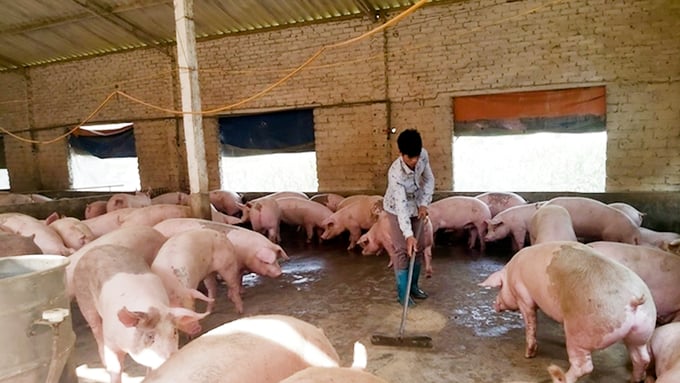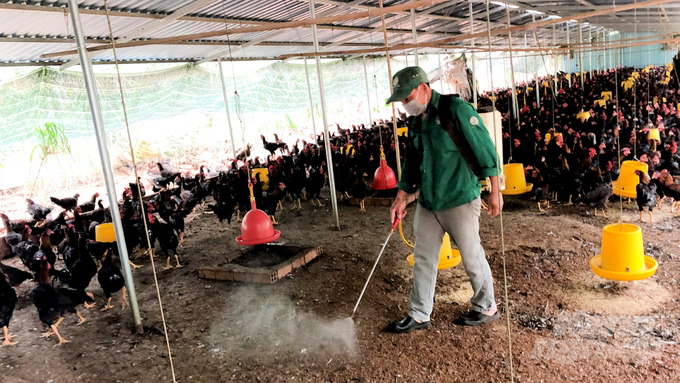November 25, 2025 | 19:30 GMT +7
November 25, 2025 | 19:30 GMT +7
Hotline: 0913.378.918
November 25, 2025 | 19:30 GMT +7
Hotline: 0913.378.918

According to the Ba Ria - Vung Tau’s Sub-department of Livestock Production and Animal Health, households with outbreaks of African Swine Fever often have the habit of using leftovers from restaurants and eateries. Photo: MS.
According to the livestock production and animal health sector in Ba Ria - Vung Tau, outbreaks of African swine fever in the province often occur in small-scale pig farms that utilize leftover food from restaurants and eateries without proper treatment before feeding the pigs. Most of these food sources lack proper veterinary hygiene conditions and food safety standards, and biological and disease safety measures are not implemented in these livestock farms.
To prevent disease outbreaks among their pigs, families like Ms. Nguyen Thi Phuong's (from Binh Chau commune, Xuyen Moc district) have taken several preventive measures based on professional advice. They strictly avoid using leftover food from restaurants and industrial kitchens, as well as food that hasn't been thermally treated for pig feeding.
Additionally, Ms. Nguyen Thi Phuong's family regularly cleans and disinfects the pigsties using lime powder, and formalin as disinfectants.
"The African swine fever outbreak in 2019 caused me to lose my entire herd of 20 pigs right at the time they were ready to be sold. Therefore, when we started raising pigs again, my family became very cautious in caring for them and actively implemented preventive measures to avoid any unfortunate disease outbreaks," said Ms. Phuong.
As for poultry, Mr. Nguyen Van Hieu, who raises over 1,500 free-range native chickens in Binh Ba commune, Chau Duc district, emphasized the importance of preventive measures during this period. He mentioned that this is the time when chickens are more susceptible to diseases because it is the period of rapid growth, and they consume more feed while being less active. The changing weather also lowers the chickens' immunity. Therefore, apart from ensuring complete vaccination, Mr. Hieu also uses electric lights to keep them warm and disinfects the surrounding areas of the chicken coop.
Mr. Hieu highlighted the risk of avian influenza in chickens, as it is a dangerous disease with a short incubation period, and the mortality rate can reach 100% within a few days. Thus, preventive measures, including proper vaccination according to professional advice, providing supplemental food to boost the chickens' immunity, and administering vitamins to minimize risks, are essential for poultry farmers.

In the face of adverse weather conditions, the risk of re-emergence of dangerous diseases in livestock herds is very high. Photo: MS.
According to the agriculture sector in Ba Ria - Vung Tau province, as of August 2023, the total livestock and poultry population in the province is quite large, reaching around 7.7 million animals of various types. The livestock industry has shown a growth rate of 4.47%, exceeding the planned targets and there have been no reported cases of dangerous infectious diseases among the livestock and poultry in the province. This positive factor ensures a stable supply of livestock products to the market, especially during the period from now until the end of the year.
Mr. Nguyen Xuan Trung, the Head of Sub-department of Livestock Production and Animal Health in Ba Ria - Vung Tau, stated that to proactively implement disease prevention and control measures on livestock and minimize the impact of diseases on livestock farmers, the Sub-department has requested localities to deploy preventive measures.
This includes disseminating information about the dangerous nature of diseases, the risk of recurrence, timely reporting when livestock and poultry are suspected or confirmed to be affected by diseases, and implementing disease prevention and control measures to ensure farmers are well-informed.
Moreover, the Sub-department will strengthen guidance for livestock farmers to strictly implement biosecurity measures. Timely detection and thorough handling of disease outbreaks will be essential to prevent widespread transmission.
In the near future, the Sub-department of Livestock Production and Animal Health in Ba Ria - Vung Tau will continue to coordinate with relevant agencies and local authorities to implement comprehensive and resolute disease prevention measures, aiming to prevent dangerous disease outbreaks and ensure the targeted growth rate of the livestock industry according to the plan.
One of the crucial strategies may involve raising awareness among livestock farmers and the general public about the importance of disease prevention measures. Educating farmers on the risks posed by infectious diseases and the economic consequences of outbreaks can encourage them to adopt proper biosecurity practices. Seminars, workshops, and training sessions can serve as effective platforms to disseminate essential information and knowledge.
Translated by Nguyen Hai Long
/2025/11/24/3536-2-112800_176.jpg)
(VAN) Dong Nai now has tens of thousands of hectares of forests certified for sustainable management, and this area will continue to be expanded in the coming period.

(VAN) Vinh Ha hamlet (Dai Xuyen commune, Hanoi) is shifting away from small-scale farming as households adopt bioscurity into their breeder chicken models.

(VAN) Heavy rains make aquatic species more vulnerable to disease. Proactive water management and high-tech systems help farmers prevent outbreaks and protect yields.

(VAN) Greenhouses are shifting production mindsets in Binh Lu commune, enabling farmers to ‘weather the sun and rain’ and secure stable vegetable harvests throughout the year.

(VAN) Green transition is crucial for the Mekong Delta amid climate change and stricter standards, offering a path toward sustainability.

(VAN) Dong Thap promotes agricultural restructuring, forms large specialized farming zones, raises the value of agricultural products and develops toward ecological and high-tech directions.
/2025/11/22/4018-4-213342_747.jpg)
(VAN) The Mekong Delta Agricultural Experts Club has attracted 143 experts and researchers to participate in providing consultancy and contributing initiatives to the development of one million hectares of high-quality rice.